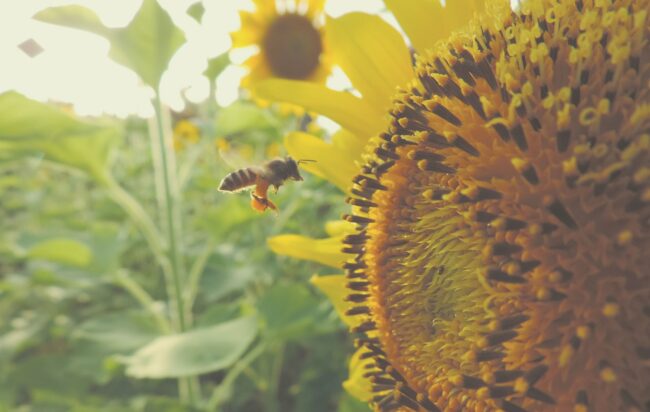If you’ve ever found yourself fascinated by the world of bees, you’re not alone. These extraordinary insects are essential players in Earth’s ecosystem and have intrigued humans for centuries. Understanding the lifespan of bees not only fuels this fascination but also offers a window into their complex behaviors and roles in nature.
Table Of Contents
−- What Determines the Lifespan of a Bee?
- A Closer Look at Different Bee Species and Their Lifespans
- Delving Into the Lives of Honey Bees
- The Environmental Equation in Bee Longevity
- The Peculiar Habits of Long-Living Bees
- The Crucial Role of Diet in Bee Lifespan
- Practical Tips for Extending Your Bees’ Lives
- The Rewards of Longevity in Bee Colonies
What Determines the Lifespan of a Bee?
It’s tempting to think of bees as having a set “expiration date,” but the reality is more complex. Multiple variables, including the species, environmental conditions, and nutritional intake, all contribute to the life expectancy of a bee.

Queens, for instance, have the longest lifespan among bee social classes. Their lives can span anywhere from one to two years. Worker bees don’t fare quite as well—those born in spring or summer typically live around 5-7 weeks. But if a worker bee emerges in winter, its life can extend to a respectable 4-6 months. Drone bees, or the males in the hive, usually live around 24 days. While these figures provide a general framework, they are just that—averages. Specific species and conditions can drastically affect how long a bee lives.
A Closer Look at Different Bee Species and Their Lifespans
Not all bees are created equal when it comes to longevity. The queen honey bee, for instance, holds the longevity crown among bee species, with the potential to live up to five years!
On the flip side, female miner bees live approximately six weeks, while male drones often have lifespans that don’t exceed one month. So, it’s crucial to recognize that life expectancy in bees is as varied as the species themselves.
But what accounts for these differences? A variety of factors, from the availability of food to specific living conditions, impact a bee’s life. For example, bees that can store more food and produce more wax generally have a survival advantage, allowing them to live longer.
Delving Into the Lives of Honey Bees
Among bee species, the honey bee (Apis mellifera) is particularly fascinating for its relatively long lifespan. Queens can live up to two years, offering stability and continuity to their colonies. Worker bees, by contrast, have lifespans that can range from a mere 6 weeks in the spring and summer to a more robust 6 months during winter. Drone bees trail behind, often living for less than a month.
The length and quality of a honey bee’s life are influenced by a range of factors, such as environment, diet, activity levels, and exposure to risks like predators and disease. Therefore, properly managing these factors is essential for extending the life of a honey bee colony.
The Environmental Equation in Bee Longevity
Environmental conditions—temperature, humidity, air quality—are far from trivial in determining a bee’s lifespan. Bees flourish in warm and dry climates, but their lifespans can decline in cold or humid conditions.
Additionally, bees are susceptible to pollutants in the air. Air quality can significantly affect their health and consequently their lifespan. Predators such as birds, spiders, and wasps also pose a considerable threat. As such, ensuring a safe and conducive environment for bees can make a difference in how long they live.
The Peculiar Habits of Long-Living Bees
Bees that survive for an extended period usually share certain characteristics. For one, they often live in environments free of harmful chemicals and abundant in food sources. Queen bees, who live the longest, typically benefit from this kind of setting, which often includes freedom from disease.
Some bees even adapt special behaviors for survival, like efficient food collection and storage strategies, particularly in preparation for winter. Understanding these habits can provide valuable insights into how different bee species manage to live longer than others.
The Crucial Role of Diet in Bee Lifespan
Diet isn’t just a human concern; it’s crucial for bees too. They need a balanced diet rich in proteins, carbohydrates, fats, vitamins, and minerals to stay healthy and live longer. Without a well-rounded diet, bees can become malnourished, leading to reduced lifespans. Therefore, beekeepers should make a concerted effort to provide diverse and abundant food sources.
Practical Tips for Extending Your Bees’ Lives
To optimize bee longevity, focus on their living conditions. Ensure they have access to a diverse range of food sources, including nectar and pollen. Keep the hive well-ventilated and dry. Also, avoid the use of pesticides and other chemicals that could harm your bees. Through careful management, you can significantly improve the quality of life and lifespan of your bee colony.
The Rewards of Longevity in Bee Colonies
A long-living bee isn’t just an intriguing subject; it’s a highly beneficial one. Extended lifespans enable bees to build stronger colonies, produce more honey, and engage in increased pollination activities. Such bees also prove more resilient to environmental hazards and changing conditions, a crucial quality for their long-term survival. In the end, healthier, long-living bees translate to more bountiful and sustainable beekeeping.
By understanding the various factors that contribute to a bee’s lifespan, you’re not just satisfying your curiosity—you’re taking a step towards better beekeeping and a more harmonious coexistence with these amazing creatures.

Editorial Staff
Our writers, editors, content managers, and SEO specialist. We all take part in crafting amazing articles. We spend hours ensuring that each article is based on facts, researched, and thorough. You'll never want to click the back button to look for more answers other than here!
